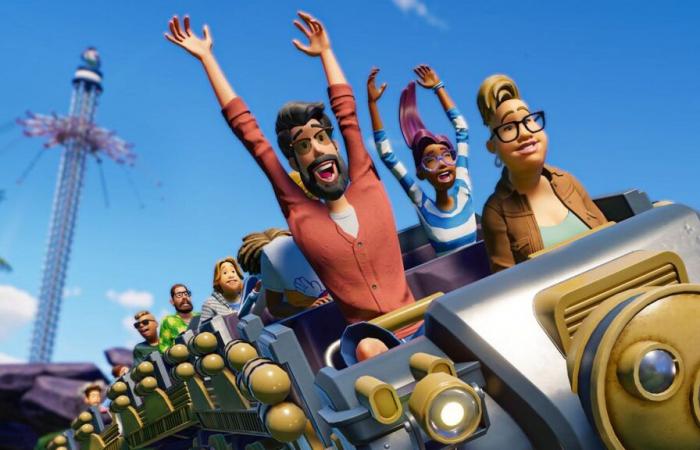When we already have a theme park simulator as good as Planet Coaster, it can be tricky to imagine what a sequel might add. And Planet Coaster 2, most of the time, does feel pretty similar to the first one. That isn’t necessarily a bad thing since I really liked the original. Adding water rides is exciting and refreshing, and even deeper visual customization is downright impressive, while equally daunting in how the options are presented. But this is still much more of a park decorating sim than a park management one.
Where the recent Frontier games (Planet Coaster and Planet Zoo) have really excelled is in the nearly ridiculous amount of visual customization options available. Hundreds of modular pieces that can be recolored, resized, rotated, and overlapped allow you to create just about anything you can imagine. The terrain editor is more powerful than ever here, and the tools for carving my dreams into the landscape are pretty intuitive. It does feel a bit like being thrown into the deep end, though. I get decision paralysis from the sheer amount of choice, and risk getting bogged down in making each little decoration perfect.
Planet Coaster 2 Screenshots
I don’t find that level of fiddliness to be as enjoyable as designing rides or running a park, but the pre-made decor doesn’t quite fill the gap to where I feel like I can skip that step and still get the theming I want. Plopping down an unadorned ride feels boring, and the pre-decorated ones don’t have quite enough variety. What I really found myself longing for was something in-between the extremes of fussing over every handrail and accepting unthemed or pre-themed attractions. But thanks to Steam Workshop integration – always a great addition – I’m sure the community will have me covered after the true detail masters have more time to tinker.
Where I do really like that fine control is when I’m building rides, and the coaster editor is more powerful and easier to use than ever. Creating banks, corkscrews, spirals, loops, and bends of all sizes feels intuitive and almost effortless thanks to the great UI. The option to automatically finish a track with one click when you’re getting close to the end works really well this time around, too, and allowed me to skip the hassle of fishing for the right angle to bring everyone safely into the station.
Sandbox mode presents a beautiful canvas for almost anything I can dream up.
Despite how much I enjoy the act of building my ideal park, the original Planet Coaster was neither challenging nor interesting as a management tycoon game, and that has unfortunately not changed. Even after messing with the difficulty settings, of which there are several, I found it almost mindlessly simple to generate infinite money with a small number of flat rides and a high entry fee. You can now sell what are basically Disney’s Fast Passes as another income stream, in addition to charging extra for a pool pass on water rides. There are deeper systems for guest preferences and even things like sunburn in sunny climates, which is all neat in theory. But when I’m making so much money that I can basically ignore all of it, why would I care? Power management is also new, but why am I building generators in a theme park game? What theme park supplies its own electricity?
Staff management is still mostly hands-off, with some nice new quality-of-life features like being able to select from three different preset pay levels instead of typing in the numbers yourself. The annoying thing this time is that, unless I was entirely missing some core feature, the ride maintenance system seems to be broken currently. No matter how many mechanics I hired – at one point I had one per ride, plus a couple extra to cover breaks – I was constantly getting notifications about rides being in poor condition or breaking down. Once they had broken down, my staff was pretty quick to address the issue. But I’m not sure what they were doing the rest of the time. Am I supposed to manually dispatch them every time a ride drops below a certain repair level? Because they don’t seem to pay attention to that until it’s too late.
I couldn’t really get my head around the scheduling screen, and the in-game tutorials are not much help. In fact, they seem to start from a point of assuming you already know how to play Planet Coaster, skipping over a lot of the basics.
Thankfully, the sandbox mode is still the star of the show for me, presenting a beautiful canvas on which to realize almost anything I can dream up. The underwhelming management layer doesn’t detract from the joy of laying out everything with ease and total freedom, building whole attractions from scratch, and getting to ride my custom coasters in glorious first-person. All of the reasons I already loved the first Planet Coaster are not only alive and well here, they have all been improved in some way. So if I sound a bit down on this sequel, it’s only because I don’t feel the need to go back over every single thing that was already great about this series, but you can check out my review of the first Planet Coaster for a refresher.
Customizable pools, flumes, splash rides, and even water coasters open up the opportunity to create totally new kinds of parks, which kept me from feeling like I was playing the same game again but a little bit prettier. I do wish the pool editor would simply let me paint a shape rather than fiddling with polygons and a somewhat iffy rounding tool. But getting the shapes I wanted was really just a matter of time.
There’s also a career mode that features a handful of increasingly complex scenarios and challenges to master. It does an okay job of introducing some new concepts, like those water rides, but I still think it’s missing some major steps to onboard someone who might be new to the series. Also the dialogue is just… ugh. I think I would rather listen to cats dancing on stainless steel sheeting than these painful little skits that wouldn’t pass muster in most modern childrens’ cartoons.
Water rides kept it from feeling like I was playing the same game.
What I did like about these scenarios, similar to those in the first game, was that they show off the kinds of things you can do with the tools available to you, serving as a source of inspiration for my own parks. I was never going to stick with them once I’d earned enough stars to move on (it’s just not as fun to finish something someone else already started than it is to build from the ground up), but I definitely stole a lot of cool ideas.
Performance is also very respectable. Even at 4K, I was getting 60+ fps on my RTX 4070 Super most of the time, though a bit below that in the absolute most elaborate parks. I was able to do really silly stuff like recreating the Erdtree from Elden Ring using what must have been hundreds and hundreds of golden pyrotechnics, and the level-of-detail swapping refused to let my shenanigans, however ridiculous, banish my park to slideshow territory.






